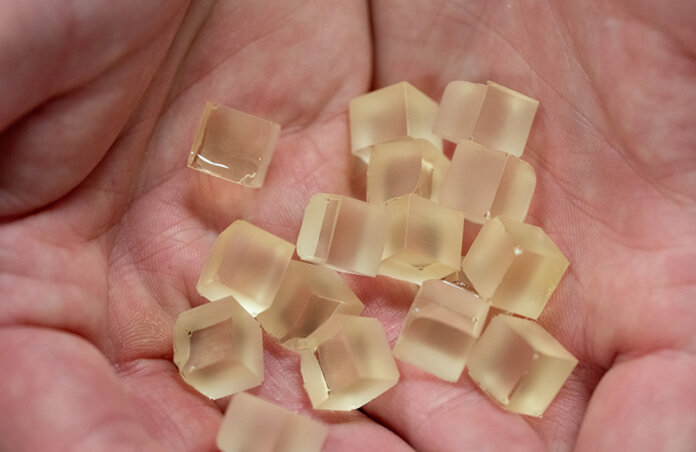Researchers at the U.S. Department of Energy’s National Renewable Energy Laboratory (NREL) see a path toward the manufacture of bio-derivable wind blades that can be chemically recycled and the components reused, ending the practice of old blades winding up in landfills at the end of their useful life.
The researchers say that new resin, which is made of materials produced using bio-derivable resources, performs on par with the current industry standard of blades made from a thermoset resin and outperforms certain thermoplastic resins intended to be recyclable.
The researchers built a prototype nine-meter blade to demonstrate the manufacturability of an NREL-developed biomass-derivable resin nicknamed PECAN. The acronym stands for PolyEster Covalently Adaptable Network, with the manufacturing process dovetailing with current methods.
Under existing technology, wind blades last about 20 years, and afterward can be mechanically recycled such as shredded for use as concrete filler. PECAN marks a leap forward because of the ability to recycle the blades using mild chemical processes.
The chemical recycling process allows the components of the blades to be recaptured and reused again and again, allowing the remanufacture of the same product.
The paper, “Manufacture and testing of biomass-derivable thermosets for wind blade recycling,” involved work from investigators at five NREL research hubs, including the National Wind Technology Center and the BOTTLE Consortium. The researchers demonstrated an end-of-life strategy for the PECAN blades and proposed recovery and reuse strategies for each component.
The findings are published in the new issue of the journal Science.
“The PECAN method for developing recyclable wind turbine blades is a critically important step in our efforts to foster a circular economy for energy materials,” says Johney Green, NREL’s associate laboratory director for Mechanical and Thermal Engineering Sciences.
Composites made from the PECAN resin held their shape, withstood accelerated weatherization validation, and could be made within a timeframe similar to the existing cure cycle for how wind turbine blades are currently manufactured.
The paper’s coauthors, all from NREL, are: Ryan Clarke, Robynne Murray, Nic Rorrer, Erik Rognerud, Allen Puente-Urbina, David Barnes, Paul Murdy, Michael McGraw, Jimmy Newkirk, Ryan Beach, Jacob Wrubel, Levi Hamernik, Katherine Chism, Andrea Baer and Gregg Beckham.
The U.S. Department of Energy (DOE) jointly funded the research through its Advanced Materials and Manufacturing Technologies Office and Bioenergy Technologies Office and their support of the BOTTLE Consortium. Additional research and funding will allow the investigators to build larger blades and to explore more bio-derived formulations.
NREL is operated for DOE by the Alliance for Sustainable Energy.




